 While I was initially taken aback by the drawn out sentences and near lack of punctuation, Ray Bradbury’s short story really intrigued me at its end. We learn throughout the story that our protagonist, George Smith, is quite the dreamer and often in his own head. Alice Smith, his wife, is quite the opposite. I’d even debate calling her the realist of the story, the grounding. As I’m sure others can agree, the ironic twist at the final act of the story was endearing as an outsider looking in, though I’m sure for George it was surely overwhelming. Meeting his favorite artist on the beach by sheer happenstance while getting to see him at work no less, sketching in the sand. What I loved most about this story in particular was the ending. The set of dialogue between George and his wife about what had just happened to him:
While I was initially taken aback by the drawn out sentences and near lack of punctuation, Ray Bradbury’s short story really intrigued me at its end. We learn throughout the story that our protagonist, George Smith, is quite the dreamer and often in his own head. Alice Smith, his wife, is quite the opposite. I’d even debate calling her the realist of the story, the grounding. As I’m sure others can agree, the ironic twist at the final act of the story was endearing as an outsider looking in, though I’m sure for George it was surely overwhelming. Meeting his favorite artist on the beach by sheer happenstance while getting to see him at work no less, sketching in the sand. What I loved most about this story in particular was the ending. The set of dialogue between George and his wife about what had just happened to him:
“Anything interesting happen on your walk?” she asked.
“No,” he said
“You look funny; George, you didn’t swim out too far, did you, and
almost drown? I can tell by your face. You did swim out too far, didn’t you?“Yes,” he said. (5)
The phrase being presented here about swimming out too far is a great metaphor for the experience George had with Picasso. He was obsessed, enthralled, completely enamored by the artist’s work. So his loss of not being able to capture Picasso’s work in the sand must’ve been heartbreaking. I really liked the line, “He kept on doing this until there was no more light in the sky or on the sand to see by.” (4) This line was what really put the metaphor together for me. He’s lost after not being able to capture the artwork, he’s too far out to sea. There is some foreshadowing on the first page as well about this metaphor, as George says he wishes he never heard the rumor about Picasso being in town. The stars can’t align that perfectly for them to meet under normal circumstances, but when they do, it ends bittersweet. George’s dream is fulfilled to an extent, and he walks away with something only he knows, a connection between him and Picasso that only they share. This is what makes the last line of the story not only sad but powerful. The tide coming in represents change, new beginnings, an erasure of what was.
“Just the tide,” he said after a while, sitting there, his eyes still shut. “Just the tide coming in.” (5)
I had not made the connection with Alice’s comment on swimming out too far, but it makes perfect sense. George got so lost in his obsession that the realization he cannot preserve the artwork the way he wants to, and he is almost drowning in that feeling. Thank you for sharing that; I found it to give more meaning to the story.